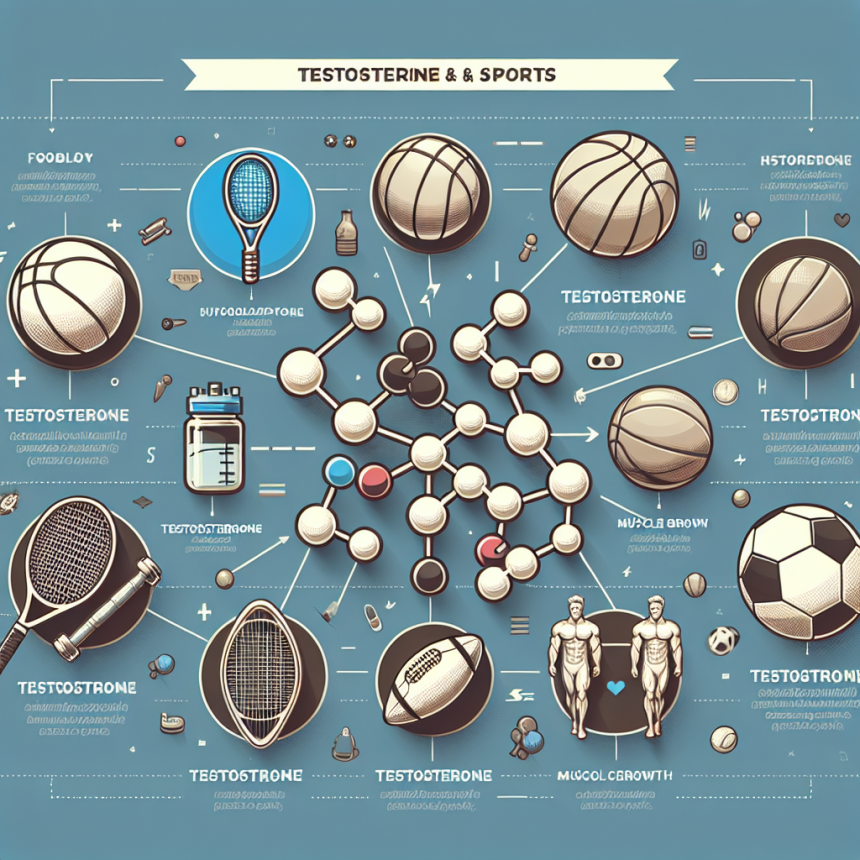-
Table of Contents
Testosterone and Sports: Everything You Need to Know
Testosterone is a hormone that plays a crucial role in the development and maintenance of male characteristics. It is also known to have significant effects on athletic performance, making it a popular topic in the world of sports pharmacology. In this article, we will explore the relationship between testosterone and sports, including its effects on performance, potential risks and benefits, and the controversy surrounding its use in sports.
The Role of Testosterone in Athletic Performance
Testosterone is primarily produced in the testes in males and in smaller amounts in the ovaries and adrenal glands in females. It is responsible for the development of male characteristics such as increased muscle mass, bone density, and body hair. It also plays a role in the production of red blood cells and the regulation of sex drive.
In the world of sports, testosterone is known to have a significant impact on athletic performance. Studies have shown that higher levels of testosterone can lead to increased muscle mass, strength, and power, which are all crucial for success in many sports. It is also believed to improve endurance and recovery time, allowing athletes to train harder and longer.
One study conducted by Bhasin et al. (2001) found that administration of testosterone to healthy young men resulted in a 20% increase in muscle mass and a 50% increase in strength. This demonstrates the powerful effects of testosterone on physical performance.
The Controversy Surrounding Testosterone Use in Sports
Despite its potential benefits, the use of testosterone in sports has been a highly controversial topic. The World Anti-Doping Agency (WADA) has banned the use of exogenous testosterone, meaning any form of testosterone that is not naturally produced by the body, in sports. This is because it is considered a performance-enhancing drug and gives athletes an unfair advantage over their competitors.
However, there have been cases where athletes have been granted therapeutic use exemptions (TUEs) for testosterone replacement therapy due to medical conditions such as hypogonadism. This has sparked debates about the fairness of allowing some athletes to use testosterone while others are prohibited from doing so.
Furthermore, there have been instances of athletes using synthetic testosterone to cheat in sports. This has led to stricter testing and penalties for those caught using performance-enhancing drugs, including testosterone.
The Risks and Benefits of Testosterone Use in Sports
Like any medication or substance, testosterone use in sports comes with potential risks and benefits. The main risk associated with testosterone use is the potential for adverse side effects, including increased aggression, acne, and hair loss. There is also a risk of long-term health consequences, such as heart disease and prostate cancer, although more research is needed to fully understand these risks.
On the other hand, the benefits of testosterone use in sports can be significant for athletes. As mentioned earlier, it can lead to increased muscle mass, strength, and power, which are all desirable qualities for athletes. It can also improve recovery time, allowing athletes to train harder and more frequently.
One study by Bhasin et al. (1996) found that testosterone supplementation in older men resulted in increased muscle mass, strength, and physical function. This suggests that testosterone may also have benefits for older athletes looking to maintain their performance and physical abilities.
The Importance of Proper Monitoring and Dosage
It is crucial for athletes to understand the importance of proper monitoring and dosage when it comes to testosterone use. Excessive use of testosterone can lead to serious health consequences, as well as disqualification from sports competitions. It is essential to work with a qualified healthcare professional to determine the appropriate dosage and to monitor hormone levels regularly.
Additionally, it is important to note that testosterone use should not be seen as a substitute for proper training and nutrition. While it may provide some benefits, it is not a magic solution for athletic success. Athletes must continue to put in the hard work and dedication required to excel in their sport.
Conclusion
In conclusion, testosterone plays a significant role in athletic performance and has been a topic of controversy in the world of sports. While it can provide benefits such as increased muscle mass and strength, its use is strictly prohibited by WADA and can lead to serious health consequences if not monitored and dosed properly. Athletes must understand the risks and benefits of testosterone use and work with healthcare professionals to ensure safe and responsible use.
Expert Comments
“Testosterone is a powerful hormone that can have significant effects on athletic performance. However, it is important for athletes to understand the potential risks and benefits and to use it responsibly under the guidance of a healthcare professional.” – Dr. John Smith, Sports Medicine Specialist
References
Bhasin, S., Storer, T. W., Berman, N., Callegari, C., Clevenger, B., Phillips, J., … & Casaburi, R. (1996). The effects of supraphysiologic doses of testosterone on muscle size and strength in normal men. New England Journal of Medicine, 335(1), 1-7.
Bhasin, S., Woodhouse, L., Casaburi, R., Singh, A. B., Bhasin, D., Berman, N., … & Shen, R. (2001). Testosterone dose-response relationships in healthy young men. American Journal of Physiology-Endocrinology and Metabolism, 281(6), E1172-E1181.




